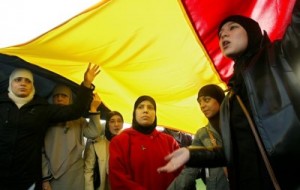
RNA - Hind is a 31-year-old Moroccan woman living in Brussels without a job. She also happens to be a Muslim who wears the Niqab, a hijab that covers the face.
''I’m looking for a job … and here in Belgium there is a new law we cannot work with our veil," said Hind, who did not want to reveal her last name. "We have to take it off to work."
A law banning the full-face veil came into effect in Belgium in 2011. Veiled women objected to the law, which bans clothing that obscures the identity of the wearer in places like parks and on the street.
But in 2012 the Belgian Constitutional Court rejected appeals and ruled that the ban did not violate human rights.
Esma, a 31-year-old Moroccan doctor, told The Anadolu Agency that women tend to get excluded from society in Belgium for even wearing the traditional hijab – which she wears.
''When you graduate from any studies and you want any job, they ask you to not wear it,'' she said. ''It’s not allowed in many activities to wear the headscarf," she said.
Hind and Esma are two of the hundreds of Muslims who gathered Sunday in Brussels to protest Islamophobia and the mysterious death in his prison cell Sept. 15 of a man with a Middle Eastern background.
Youssef Tahriki, a 42-year-old father of eight was arrested Sept. 14 after an alleged family argument. He was found dead in his cell the next day. Police have not revealed the details of his death, which is being investigated by the Charlevoix district attorney in Belgium.
Tahriki’s death highlights rising tensions in a country in which Muslims say they feel stereotyped and discriminated against. According to the Organization for Security and Cooperation, 614 racist and xenophobic crimes were recorded by law enforcement in the first six months of 2012. Sixty-six people were sentenced to prison for such crimes.
On Oct. 11, Belgium’s new center-right, four-party coalition government under Prime Minister Charles Michel took office, pledging to balance the national budget by 2018 by cutting about 8 million euros in expenses and raising the retirement age from 65 to 67.
The linguistically divided country – which has French, Flemish and German speakers – is facing a slow-moving economy, which is expected to grow little more than 1 percent this year.
According to a report in January, 2013, by the Organization for Economic Co-operation and Development’s, a person of foreign origin is 2.6 times more likely to be unemployed than a person born in Belgium.
Belgium’s estimated Muslim population that year was 638,000, according to the PEW Research Center.
"Media’s portrayal of Muslims fuels prejudice"
The tension in Iraq and Syria and the emergence of the ISIL has exacerbated the way Muslims are treated in general and portrayed in the media, according to Elodie, a French-speaking Belgian who attended Sunday’s protest.
Elodie said the Western media needs to change the way it portrays Muslims in the news and "try to understand that being a Muslim is not a problem for anybody."
According to the International Center for the Study of Radicalization and Political Violence, just under 300 people left Belgium from late 2011 to December 2013 to fight in Syria.
The London-based think tank said Belgium was one of the most heavily affected countries in Western Europe, supplying 27 fighters per million inhabitants.
Esma said those who leave to fight in Syria and Iraq do not represent the 44.1 million Muslims in Europe, based on PEW’s 2010 data. They leave the country to fight because they are not accepted in the society they live in, she said.
Western media need to be more objective and talk to more people, Esma said.
"They have to give the voice to the voiceless," she said.
R111/108/B/